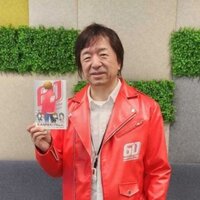Crypton Future Media 30th Anniversary: special interview

(translated from the original interview in japanese, available here:)
https://www.wantedly.com/companies/crypton/post_articles/992716
Today, July 21st, 2025, marks the 30th anniversary of Crypton Future Media's founding!
To commemorate this, our CEO Ito's book "The Future of Creation: How Hatsune Miku Was Born in Hokkaido" (published by Chuokoron-Shinsha) will be released on July 23, 2025. We hope that the book will provide you with a glimpse into Ito's life, thoughts, and hopes for the future.

Also, starting today, as part of the 30th anniversary of the founding of Crypton Future Media, Wantedly will be running a special series of articles (6 articles in total) looking back on the company's 30-year history together with our company president, Ito. We hope to introduce our company's business once again, focusing on the topics that could not be packed into "The Future of Creation." If you are interested, please stay with us until the final installment.
[30th Special Episode.1 PART1] The History of Crypton
The first theme is "The History of Crypton." Hatsuyama, who has been with the company for 20 years and knows the transition of the office from the back office, and Nishio, who was involved in the launch of the character licensing business, will also be joining us. Together with Ito, they will talk about the time when Crypton was founded and the history of the office.

From left to right: Hatsuyama, Ito, and Nishio
Hiroyuki Ito : CEO of Crypton Future Media, Inc. After working at Hokkaido University, he founded Crypton Future Media, Inc. in Sapporo in July 1995. He is currently working on developing services and technologies inspired by sound, such as DTM software, music distribution aggregators, and 3DCG technology. He was awarded the Blue Ribbon Medal in 2013.
Fumiko Hatsuyama : Joined the company in 2005. Manager of the administrative team that handles accounting, recruitment, human resources, labor, general affairs, public relations, accounting, and other company-wide administrative matters. She has supported the company as a back office worker for 20 years.
Nishio Kimitaka : Joined the company in 2007. After launching and expanding the character licensing business for "Hatsune Miku", he is now a manager in the President's Office. In addition to developing existing businesses, he is also involved in developing new businesses that incorporate new technologies such as AI, aiming to expand creative opportunities and fields for creators.
The company I started at age 30 is now 30!

--First, let me ask you about President Ito.
Our company will celebrate its 30th anniversary in July this year, and you turned 60 in March this year, so does that mean you started your company at the age of 30?
Ito : Yes. The company I started when I was 30 has now turned 30. When I think about it, the 30th anniversary feels even more meaningful.
This year, I received a surprise cake and bouquet of flowers from all the employees on my birthday.

For April Fool's Day, we prepared something called the "Ito Hiroyuki Kanreki Pack," which imitates our company's product, the "Piapro Characters Super Pack."
The company's founding anniversary is July 21st, but I already feel like this year is more special than any other year before.

- I understand that you got a job after graduating from high school and worked as an employee at Hokkaido University before starting your own company. Could you please tell us again how you ended up starting your own company?
Ito : I was born in Shibecha, a rural town in Hokkaido where there are more cows than people. In those days, it was very common to get a job after graduating from high school, and I became a civil servant after graduating from high school. I was assigned to the Faculty of Engineering at Hokkaido University.
When I started working, the Internet had not yet spread to ordinary households, but it was introduced to universities early on. I was able to use it as part of my job. Now that the Internet and smartphones are commonplace, it may not seem like a big deal, but back then there were no mobile phones, and it took more than a month to exchange letters with friends overseas. That's why I was so shocked by the Internet, which allows data to be exchanged instantly regardless of the actual distance. It was so interesting to imagine what I could do if the Internet became widespread. I thought that turning the ideas I had into reality would be much more interesting than continuing to work as a civil servant, so I decided to start a business.
-So your vision of the potential of the Internet was what prompted you to start your own company. Our company was established as a "sound trading company," but where did the idea of making sound into a business come from?
Ito : Yes. The reason I felt the various possibilities of the Internet was largely due to the influence of futurist Alvin Toffler, but I'll leave that out for now as I talk about that in "The Future of Creation." I've always loved music, and after I started working, I got into sound sampling (recording sounds and importing them as sound material data). At the time, I think I had 2,000 to 3,000 floppy disks with various sounds on them in my apartment.
Since I had made so many, I wanted to have many people listen to the sounds I made. I started exchanging sound materials with people overseas using the personal ads section of the American music magazines I read at the time.
When I received an inquiry through a personal ad, I would first send my own catalog by mail or fax. When I received an order, I would save the sound material on a floppy disk and mail it. As the number of such exchanges increased, and due to changes in the exchange rate, I started importing overseas sound sources and software and selling them domestically.
These hobby activities became the foundation of my business, and I founded Crypton as a "sound trading company" that imports and sells overseas sound sources and software.
I thought that if I combined my love of "sound" with the Internet, I could do a lot of things. When I founded the company, I was still selling software packages by mail, but even before I started the company, I was convinced that one day I would be able to sell "sound" downloads over the Internet.
--Now that I think about it, there's a story that says "Crypton is Sapporo's first internet company." Is there an anecdote that supports this?
Ito : Ah, it was when we submitted our articles of incorporation. When you set up a company, you have to submit articles of incorporation (documents that outline the company's fundamental principles) to a notary public, but when I wrote "Internet-related business" on it and submitted it, it was rejected. The reason was, "What is the Internet?" "Internet is not a common word, so it cannot be recognized." I explained from the very beginning what the Internet is, and finally they accepted it.
Because of that, I believe we are the first company in Hokkaido to advertise ourselves as an "Internet-related business."

(translated from the original interview in japanese, available here:)
https://www.wantedly.com/companies/crypton/post_articles/992716
Today, July 21st, 2025, marks the 30th anniversary of Crypton Future Media's founding!
To commemorate this, our CEO Ito's book "The Future of Creation: How Hatsune Miku Was Born in Hokkaido" (published by Chuokoron-Shinsha) will be released on July 23, 2025. We hope that the book will provide you with a glimpse into Ito's life, thoughts, and hopes for the future.

Also, starting today, as part of the 30th anniversary of the founding of Crypton Future Media, Wantedly will be running a special series of articles (6 articles in total) looking back on the company's 30-year history together with our company president, Ito. We hope to introduce our company's business once again, focusing on the topics that could not be packed into "The Future of Creation." If you are interested, please stay with us until the final installment.
[30th Special Episode.1 PART1] The History of Crypton
The first theme is "The History of Crypton." Hatsuyama, who has been with the company for 20 years and knows the transition of the office from the back office, and Nishio, who was involved in the launch of the character licensing business, will also be joining us. Together with Ito, they will talk about the time when Crypton was founded and the history of the office.

From left to right: Hatsuyama, Ito, and Nishio
Hiroyuki Ito : CEO of Crypton Future Media, Inc. After working at Hokkaido University, he founded Crypton Future Media, Inc. in Sapporo in July 1995. He is currently working on developing services and technologies inspired by sound, such as DTM software, music distribution aggregators, and 3DCG technology. He was awarded the Blue Ribbon Medal in 2013.
Fumiko Hatsuyama : Joined the company in 2005. Manager of the administrative team that handles accounting, recruitment, human resources, labor, general affairs, public relations, accounting, and other company-wide administrative matters. She has supported the company as a back office worker for 20 years.
Nishio Kimitaka : Joined the company in 2007. After launching and expanding the character licensing business for "Hatsune Miku", he is now a manager in the President's Office. In addition to developing existing businesses, he is also involved in developing new businesses that incorporate new technologies such as AI, aiming to expand creative opportunities and fields for creators.
The company I started at age 30 is now 30!

--First, let me ask you about President Ito.
Our company will celebrate its 30th anniversary in July this year, and you turned 60 in March this year, so does that mean you started your company at the age of 30?
Ito : Yes. The company I started when I was 30 has now turned 30. When I think about it, the 30th anniversary feels even more meaningful.
This year, I received a surprise cake and bouquet of flowers from all the employees on my birthday.

For April Fool's Day, we prepared something called the "Ito Hiroyuki Kanreki Pack," which imitates our company's product, the "Piapro Characters Super Pack."
The company's founding anniversary is July 21st, but I already feel like this year is more special than any other year before.

- I understand that you got a job after graduating from high school and worked as an employee at Hokkaido University before starting your own company. Could you please tell us again how you ended up starting your own company?
Ito : I was born in Shibecha, a rural town in Hokkaido where there are more cows than people. In those days, it was very common to get a job after graduating from high school, and I became a civil servant after graduating from high school. I was assigned to the Faculty of Engineering at Hokkaido University.
When I started working, the Internet had not yet spread to ordinary households, but it was introduced to universities early on. I was able to use it as part of my job. Now that the Internet and smartphones are commonplace, it may not seem like a big deal, but back then there were no mobile phones, and it took more than a month to exchange letters with friends overseas. That's why I was so shocked by the Internet, which allows data to be exchanged instantly regardless of the actual distance. It was so interesting to imagine what I could do if the Internet became widespread. I thought that turning the ideas I had into reality would be much more interesting than continuing to work as a civil servant, so I decided to start a business.
-So your vision of the potential of the Internet was what prompted you to start your own company. Our company was established as a "sound trading company," but where did the idea of making sound into a business come from?
Ito : Yes. The reason I felt the various possibilities of the Internet was largely due to the influence of futurist Alvin Toffler, but I'll leave that out for now as I talk about that in "The Future of Creation." I've always loved music, and after I started working, I got into sound sampling (recording sounds and importing them as sound material data). At the time, I think I had 2,000 to 3,000 floppy disks with various sounds on them in my apartment.
Since I had made so many, I wanted to have many people listen to the sounds I made. I started exchanging sound materials with people overseas using the personal ads section of the American music magazines I read at the time.
When I received an inquiry through a personal ad, I would first send my own catalog by mail or fax. When I received an order, I would save the sound material on a floppy disk and mail it. As the number of such exchanges increased, and due to changes in the exchange rate, I started importing overseas sound sources and software and selling them domestically.
These hobby activities became the foundation of my business, and I founded Crypton as a "sound trading company" that imports and sells overseas sound sources and software.
I thought that if I combined my love of "sound" with the Internet, I could do a lot of things. When I founded the company, I was still selling software packages by mail, but even before I started the company, I was convinced that one day I would be able to sell "sound" downloads over the Internet.
--Now that I think about it, there's a story that says "Crypton is Sapporo's first internet company." Is there an anecdote that supports this?
Ito : Ah, it was when we submitted our articles of incorporation. When you set up a company, you have to submit articles of incorporation (documents that outline the company's fundamental principles) to a notary public, but when I wrote "Internet-related business" on it and submitted it, it was rejected. The reason was, "What is the Internet?" "Internet is not a common word, so it cannot be recognized." I explained from the very beginning what the Internet is, and finally they accepted it.
Because of that, I believe we are the first company in Hokkaido to advertise ourselves as an "Internet-related business."










